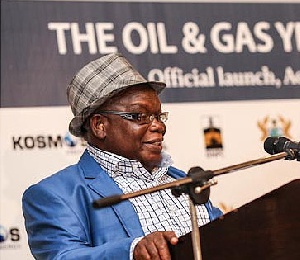The chairman of the Parliamentary Select Committee on Mines and Energy, Alhaji Amadu Sorogho, has disclosed that Deputy Minister of Petroleum Benjamin Spencer Dagadu took huge sums of money as end-of-service benefit from the Ghana National Petroleum Corporation (GNPC) where he once worked.
The issue has caused public uproar since news broke that GNPC had admitted that its board had approved the payment for former Chief Executive Officer (CEO) Tsatsu Tsikata; his wife, Esther Cobbah, who was formerly Public Affairs Manager; Benjamin Dagadu, then Field Evaluation and Development Manager and Nana Boakye Asafo-Adjaye, former Ag. Chief Executive Officer.
Even though GNPC failed to disclose how much had been paid to the beneficiaries of the largesse, sources claim the money is in the range of GH¢5 million.
Strangely, all the four beneficiaries are linked to the governing National Democratic Congress (NDC).
Whistleblowing
It was the Member of Parliament (MP) for Adansi Asokwa, Kobina Tahir Hammond (popularly known as KT Hammond), who blew the lid when he accused the Alex Mould-led GNPC of secretly wasting taxpayers’ money on the former top staff after leaving the Corporation for more than a decade now.
He alleged that Tsatsu Tsikata, a former Chief Executive who left the Corporation 15 years ago, had been paid GH¢1 million as end-of-service benefit for work done during his tenure, while Messrs Asafo-Adjaye and Dagadu as well as Ms Cobbah received almost GH¢1 million and about GH¢600,000 respectively.
KT Hammond believes there was no legal basis for the payments.
DAILY GUIDE learnt that the payments did not enjoy the support of the legal adviser to GNPC.
Adwoa Wiafe, GNPC’s head of legal department, in a documented opinion dated July 30, 2015, strongly asserted that there was no legal basis for the awards, adding, “Any legal claims against the Corporation by the former employees are statute barred.”
Section 4(F) of the Limitations Act 1972 gives up to six years for an aggrieved party to enforce an action to recover any sum recoverable by virtue of any enactment.
In the case of Tsatsu Tsikata, who was sacked by former President Jerry John Rawlings in 2000, it took 15 years before the said ex-gratia was paid to him.
According to Mr Hammond, the payments were totally uncalled-for and were just a means to dissipate the country’s oil funds, especially after the person had been sacked over 15 years ago.
“The place had collapsed. If it was a company, the company had collapsed. There was no money to be paid to anybody. Indeed, for running the company the way he did, Mr Tsikata would have had to account in the criminal court for what he had done,” KT Hammond suggested.
The GNPC is currently before the Parliamentary Select Committee to answer for the controversial payments and Alhaji Sorogho, who is chairing the committee, confirmed on Accra-based Oman FM Thursday that only one person – Mr Dagadu, Deputy Minister of Petroleum – had collected his cheque.
Mr Dagadu, when asked about the payment, arrogantly said it was a past issue, meaning he had ‘chopped’ it.
Sorogho said that the committee had not come to any conclusions yet and added that the panel had asked GNPC to provide some documents.
Sorogho said, “Discussions have so far been limited to areas around their collective bargaining agreement.”
The MP stressed that documentary evidence was key in the whole probe and said they had not yet received all the documentary evidence necessary for them to make a substantial conclusion.
He however said since three people had not yet received any ex-gratia payment, the committee would wait to know the exact amount each individual was to receive.
Alhaji Sorogho also justified his committee’s summoning of GNPC without the speaker of Parliament’s referral and provided clarification on the protocol surrounding summons, pointing out that the speaker’s referrals only come in when there is an “issue brought by government or by NPP or to Mr Speaker, most of them bills and a few of them too petitions.”
Alhaji Sorogho stressed that the public have a stake in this GNPC saga, saying, “The committee works to satisfy the public. Mind you, members of the committee are elected representatives of the people and so anything that has a public concern is also a concern of the committee.”
He however pointed out that the speaker and the Members of Parliament would be made aware of the committee’s findings upon the conclusion of their work next week Wednesday.
Justification
However, a board member of GNPC, Abraham Amaliba, said Tsatsu and others deserve the end-of-service payment.
According to him, the six-year limitation period is for those who go to sleep on their rights and are not vigilant.
General News of Sunday, 6 December 2015
Source: Daily Guide

















